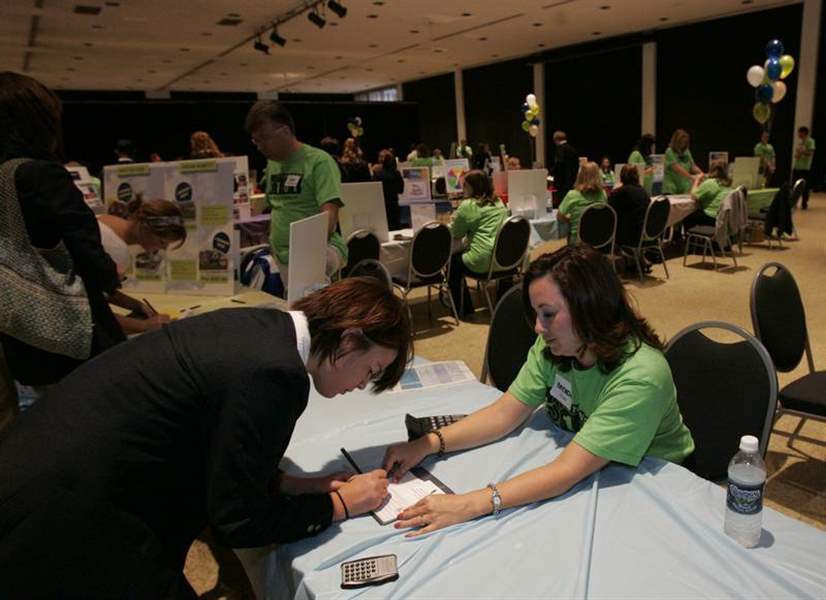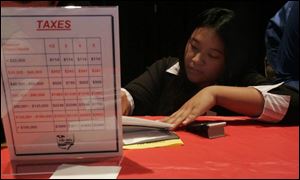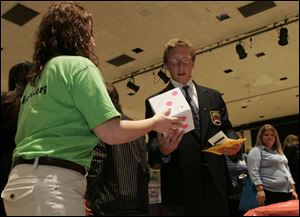
400 area high schoolers learn life-size lessons on finances
10/19/2006
Casey Cartwright makes a checking-account deposit.

Jenny Phounarath, a senior at Wauseon High, pays taxes on her assigned $42,500 salary.
Life was going pretty well for Casey Cartwright until she decided to get a new car instead of a used one.
But payments for her $19,216 Dodge Stratus put too much of a strain on her payroll clerk's budget, so she ended up $38 in debt for the month.
Fortunately, Ms. Cartwright is a senior at Anthony Wayne High School in Whitehouse, and the "life" she led yesterday was a game aimed at teaching students about personal finance. She learned that although buying a modest two-bedroom house might be a good choice for a single woman making more than $29,000 a year, getting a new car isn't.
"You've just got to see what's most important at the time," she said.

Priscilla Fleck, of the Fremont Federal Credit Union, hands Robby Yohe the die that yielded an $80 tire bill.
She was one of 400 students from area high schools attending a Finances 101 program in the University of Toledo's Student Union. The event was organized by the Northwest Chapter of the Ohio Credit Union League as part of International Credit Union Week.
Armed with checkbooks and calculators, the students took turns walking around one of three "game boards" to try to budget a month's salary from randomly chosen jobs. They could collect families, bills, and breaks like winning $100 in the lottery as part of the program.
"A lot of students leave here thinking 'I didn't realize things would cost so much,'•" said Beth Carpenter, chairman of the event for the trade group.
Many of the students have part-time jobs and are trying to save money. Ms. Cartwright, for example, said she is saving some for college from her jobs as a salon receptionist and restaurant server, and the rest goes to pay bills including cell phone and car insurance.

Casey Cartwright makes a checking-account deposit.
But the game threw in additional factors such as health-care insurance, unexpected medical expenses, child care, taxes, student loans, groceries, and utilities.
The event included pure chance, such as spinning a wheel to get the $100 lottery windfall, or having to shell out $100 to be in a wedding. At other times, choices had to be made.
At the game, Robby Yohe, a Bowling Green High School senior, was making more than $65,000 a year as an industrial engineer, but he opted for a two-bedroom apartment and used Chevrolet Cavalier for his family of four. He had nearly $2,600 left after a month, even though the roll of the dice at one point cost him $80 for a new tire.
The dream house, he said, could wait until he had more money saved.
"I don't want to spend my whole life with bad credit and debt," Mr. Yohe said.
For some students, it didn't seem to matter what choices they made.
Anna Ramirez, a senior at Oregon's Clay High School, had to support herself and two children as a child-care worker making less than $16,500 a year. Trying to cut corners with housing and other expenses didn't help, she said.
"I ended up broke," Ms. Ramirez said. "My kids were almost taking cold showers. It was hard."
Even with a fictional annual salary of $42,500 a year as an elementary teacher, Wauseon High School senior Jenny Phounarath said she had a hard time saving money as a single mother of one.
"I don't want a child - yet," she said with a laugh. "They're kind of expensive."
Contact Julie M. McKinnon at:
jmckinnon@theblade.com
or 419-724-6087.